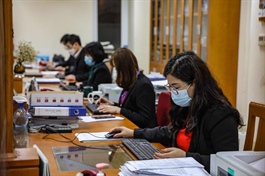Vietnam’s central bank raises operating interest rates to control inflation
Vietnam’s central bank raises operating interest rates to control inflation
The State Bank of Vietnam (SBV) announced it would raise the ceiling interest rates of bank deposits as well as a series of operating interest rates starting Tuesday to control inflation.

In its announcement on Monday evening, the SBV decided to raise the operating interest rates by one percentage point per year in order to control inflation and stabilize the macro-economy and currency.
This is the second increase in operating interest rates announced by the SBV within the past month.
Accordingly, refinancing interest rates jumped from five to six percent per year, while the discount rate were adjusted from 3.5 to 4.5 percent per year.
Interest rates for overnight loans in interbank electronic payments and loans to cover capital shortfalls in clearing payments of the central bank for credit institutions increased from six to seven percent a year.
The SBV also raised the maximum interest rate applicable to deposits with terms of less than one month from 0.5 to one percent a year.
The maximum interest rate applicable to deposits with terms from one month to less than six months rose from five to six percent per year.
Interest rates for deposits with terms of six months or more will be set by credit institutions on the basis of supply and demand of the market.
The maximum short-term lending interest rate in dong of credit institutions in a number of economic sectors and industries climbed from 4.5 to 5.5 percent a year.
The SBV said it has been operating a flexible monetary policy to control inflation, support economic recovery, adapt to domestic and foreign market developments, stabilize the currency and foreign exchange markets, and ensure the safety of the banking system.
However, global inflation is still high, with the U.S. Federal Reserve having adjusted the target interest rate five times to about 3.25 percent a year.
The U.S. dollar has appreciated strongly, putting pressure on interest rates and domestic exchange rates as well as on inflation.
The Vietnamese central bank will continue to closely monitor domestic and international market developments in order to promptly and flexibly administer monetary policies, and be ready to intervene in the currency and foreign exchange markets to meet the liquidity needs of banks.





















